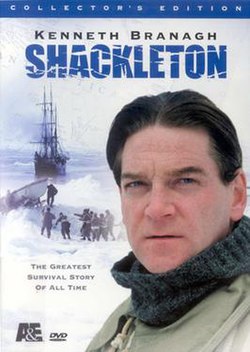| Shackleton | |
|---|---|
 Collector's Edition DVD cover | |
| Genre | Biography, drama |
| Written by | Charles Sturridge |
| Directed by | Charles Sturridge |
| Starring | Kenneth Branagh |
| Theme music composer | Adrian Johnston |
| Country of origin | United Kingdom |
| Original languages | English Norwegian German |
| No. of series | 1 |
| No. of episodes | 2 |
| Production | |
| Producer | Selwyn Roberts |
| Cinematography | Henry Braham |
| Editor | Peter Coulson |
| Running time | 206 minutes |
| Original release | |
| Network | Channel 4 |
| Release | 2 January – 3 January 2002 |
Shackleton is a 2002 British television miniseries. It was written and directed by Charles Sturridge and starring Kenneth Branagh as explorer Sir Ernest Shackleton. The film tells the true story of Shackleton's 1914 Antarctic expedition on the ship Endurance . The cast includes Kevin McNally, Lorcan Cranitch, Embeth Davidtz, Danny Webb, Matt Day and Phoebe Nicholls (also the director's wife) as Lady Shackleton. It was filmed in the UK, Iceland and Greenland. The film used first-hand accounts by the men on the expedition to retell the story. Shackleton biographer Roland Huntford was a production advisor.
Contents
Shackleton was first broadcast in two parts by Channel 4 in January 2002. In North America the film was first broadcast by the A&E Network in April 2002. The film was nominated for seven Emmy Awards, [1] six BAFTA Awards, [2] and a Golden Globe Award. [3]